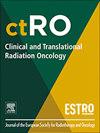剂量递增的质子再照射治疗局部复发直肠癌的急性毒性和生活质量:前瞻性ReRad II试验
IF 2.7
3区 医学
Q3 ONCOLOGY
引用次数: 0
摘要
背景和目的放射前患者的局部复发性直肠癌(LRRC)仍然是一个临床挑战。调强质子治疗(IMPT)使剂量递增具有改善肿瘤控制的潜力,而不影响危及器官(OAR)的剂量。然而,关于毒性和患者报告结果(PROs)与生活质量(QoL)的前瞻性数据有限。材料和方法这项计划中的中期分析来自前瞻性II期临床试验(NCT04695782),报告了前25名接受剂量递增IMPT治疗LRRC的患者的急性毒性和PROs。患者接受55 Gy(相对生物有效性(RBE)) 44分(新辅助)或57.5-65 Gy (RBE) 46-52分(最终)。急性毒性用NCI-CTCAE分级。在治疗前、治疗期间和3个月随访时,采用EORTC QLQ-C30和- CR29问卷对PROs进行评估。线性混合模型评估了纵向PRO轨迹。结果在25例患者中,49个总肿瘤体积导致29个临床靶体积(中位数:84.2 cm3)。膀胱、肠袋和肠袢的平均中位数分别为7.5、1.8和11.5 Gy(RBE);对应的D0.03cc分别为58.1、59.9、59.3 Gy(RBE)。2例已有肠梗阻发作的患者发生≥3级急性毒性(肠梗阻)。尿潴留与膀胱D0.03cc(Gy)相关。随着时间的推移,赞成者的整体健康得分稳定,情绪和认知功能有所改善。结论中期结果支持剂量递增的IMPT再照射治疗LRRC的可行性,急性毒性可控,生活质量保持。该试验的继续将为LRRC管理的长期结果提供信息,并指导未来的治疗策略。本文章由计算机程序翻译,如有差异,请以英文原文为准。
Acute toxicity and quality of life in dose-escalated proton reirradiation for locally recurrent rectal cancer: The prospective ReRad II trial
Background and purpose
Locally recurrent rectal cancer (LRRC) in pre-irradiated patients remains a clinical challenge. Intensity-Modulated Proton Therapy (IMPT) enables dose escalation with potential for improved tumour control without compromising dose to organs at risk (OAR). However, prospective data on toxicity and patient-reported outcomes (PROs) with quality of life (QoL) are limited.
Materials and Methods
This planned interim analysis from the prospective phase II ReRad II trial (NCT04695782) reports acute toxicity and PROs in the first 25 patients treated with dose-escalated IMPT for LRRC. Patients received either 55 Gy (relative biological effectiveness (RBE)) in 44 fractions (neoadjuvant) or 57.5–65 Gy (RBE) in 46–52 fractions (definitive). Acute toxicity was graded using NCI-CTCAE. PROs were assessed using EORTC QLQ-C30 and −CR29 questionnaires at pretreatment, during treatment, and at 3-month follow-up. A linear mixed model evaluated longitudinal PRO trajectories.
Results
Among 25 patients, 49 gross tumour volumes resulted in 29 clinical target volumes (median: 84.2 cm3). Median Dmean to bladder, bowel bag, and bowel loops were 7.5, 1.8, and 11.5 Gy(RBE); corresponding D0.03cc were 58.1, 59.9, and 59.3 Gy(RBE). Grade ≥3 acute toxicity (ileus) occurred in 2 patients with pre-existing ileus episodes. Urinary retention was associated with bladder D0.03cc(Gy). PROs showed stable global health scores over time, with improvements in emotional and cognitive function.
Conclusion
Interim results support the feasibility of dose-escalated IMPT reirradiation for LRRC, with manageable acute toxicity and preserved QoL. Continuance of the trial will inform long-term outcomes and guide future treatment strategies for LRRC management.
求助全文
通过发布文献求助,成功后即可免费获取论文全文。
去求助
来源期刊

Clinical and Translational Radiation Oncology
Medicine-Radiology, Nuclear Medicine and Imaging
CiteScore
5.30
自引率
3.20%
发文量
114
审稿时长
40 days
 求助内容:
求助内容: 应助结果提醒方式:
应助结果提醒方式:


